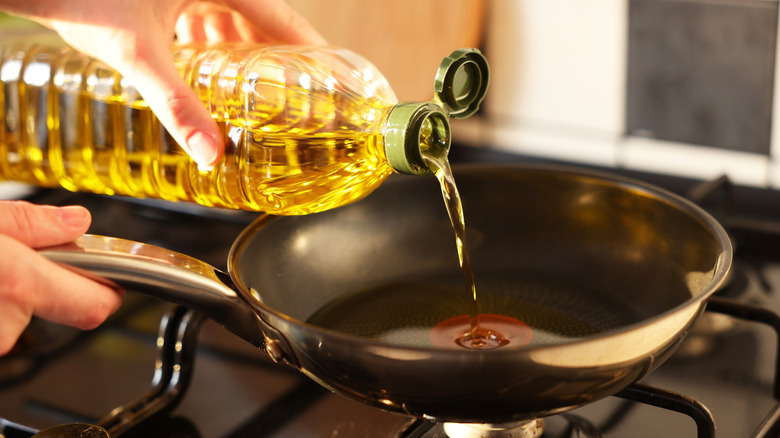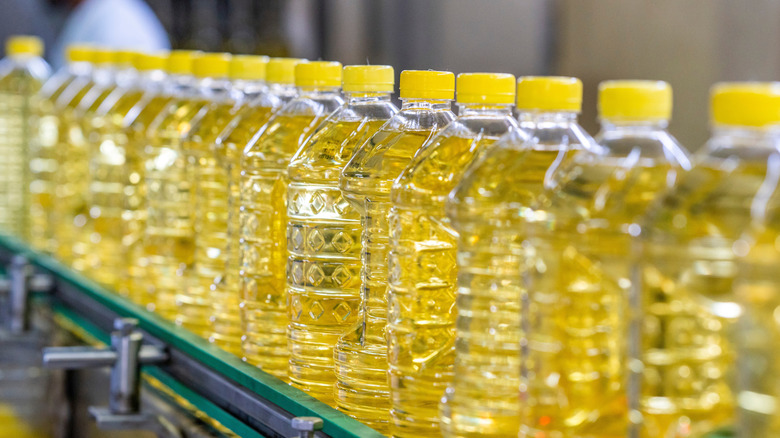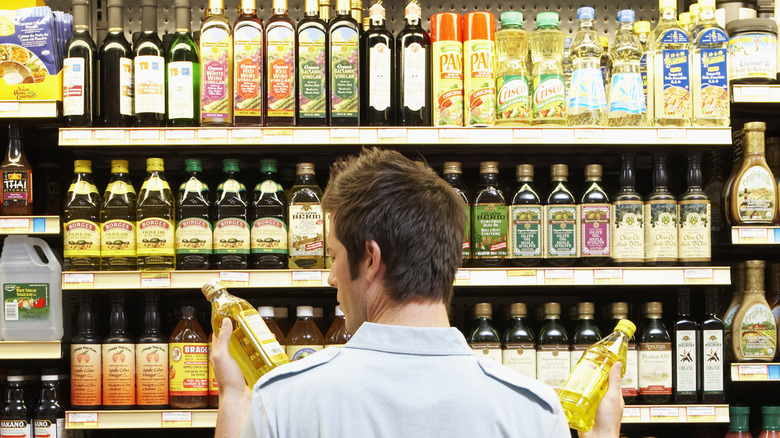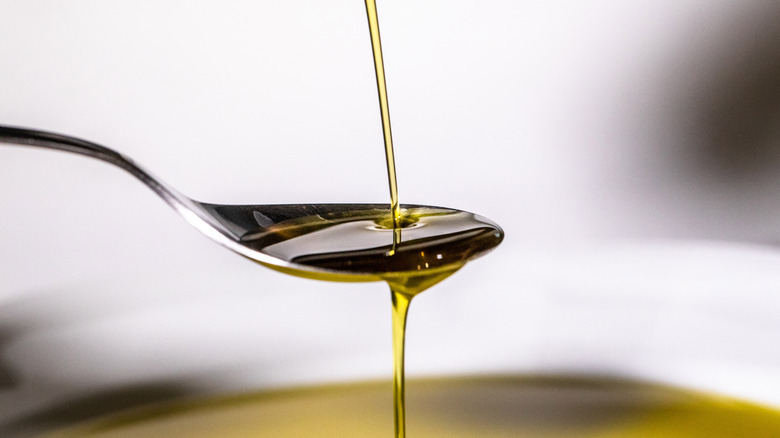How To Properly Store Vegetable Oils To Prolong Their Shelf Life
In all likelihood, you don't think about where you keep your vegetable oil. There are plenty of ingredients in our kitchens that we stress about preventing from going moldy, keeping in the right part of the fridge or the freezer, and deciphering what those expiration dates really mean. But somehow, oil is easy to just forget about — after all, there are some things that are preserved in oil, so surely it's a food that just doesn't expire, right?
While vegetable oil has a relatively long shelf life compared to other things in your kitchen, if you have a big jug or don't reach for it that often, it can still go bad before you're done with it. And all of that assumes that you're storing it properly. Improper storage of your vegetable oil can drastically reduce the shelf life of your oils and make for unappetizing and even hazardous results, whether you're using it for frying, marinades, salad dressings, or baking. The worst place to keep your vegetable oil is on the counter right next to your stove (which is statistically probably where you're keeping it right now). For a long shelf life, vegetable oil should be stored in a well-sealed container, away from heat sources, and kept out of sunlight.
The factors that damage your oil's shelf life (and how to avoid them)
There are three factors that you need to combat if you want your vegetable oil to have a long shelf life and not end up going rancid. The first factor is heat. When oil is heated, the chemical reactions that take place cause the oil to break down, and it will go rancid faster. While that's most common in a frying pan (which is also one of the arguments against excessive reuse of cooking oil), keeping your oil bottle right next to the stovetop is going to mean it keeps being heated and then cooled down, two or three times a day for the duration of the bottle.
The next factor to consider is air. This is all about oxidization. If oil is exposed to the air, then it will oxidize faster and therefore start to go rancid faster. Make sure you keep your container closed when not using it, and that the closure is fully sealing the oil in and keeping it airtight. If not, consider transferring it to a new container.
The final factor to consider with regards to the shelf life of vegetable oil is light. Light, especially direct sunlight, can cause damage to your cooking oil as it speeds up the oxidization of fatty acids, among other things. To avoid this problem, you should keep your oil in a dark cupboard, or in a bottle that will help to protect the contents from the light. You might have noticed that some oils, particularly well-stored olive oil and avocado oil, tend to come in green or brown glass — this is to help prevent the light from affecting the shelf life of the oil inside.
Why vegetable oil's shelf life is important (even if you don't mind the taste)
When you open a new bottle of vegetable oil, you likely won't notice any smell to it. However, if the oil is rancid, you can often tell because it smells sour or like Play-Doh. Additionally, it will have an off or bitter flavor, can be stickier than usual, or take on a darker color than you're used to seeing. Any of these might be off-putting to you, but in a pinch, you might be tempted to just shrug and use the oil anyway — after all, will you even be able to tell after it's baked in a cake, or just used to fry some breakfast? Even more likely, you might just not think about checking your oil to see if it's bad.
However, using rancid oil can have some pretty serious effects on your health. When the oil breaks down and oxidizes, harmful free radicals occur in the vegetable oil. These free radicals are more likely to react with your body and can lead to cell damage. As well as causing inflammation and digestive issues, these free radicals have been linked to a range of diseases including heart disease, arthritis, diabetes, and cancer. So while it might feel like a hassle to keep your oil in a cupboard and check it regularly to make sure it's still good, it's probably worth it in the long run.
What to do with vegetable oil that has gone bad
Even if you store vegetable oil in ideal conditions, it's usually only good for around 12-18 months. That might not be an issue if your kitchen is high traffic or if you only buy vegetable oil in smaller amounts. However, if you find that your oil has been sitting around too long because you bought a giant container or some got stuck at the back of your cupboard, then you need to dispose of it.
When disposing of vegetable oil, it's important not to just tip it down the drain. Oil can solidify and cause severe problems in your local sewer systems, or it can leak out into the local ecosystem. You can dispose of cooking oil by putting it in the trash as long as it is in a sealed container (never pour it directly into your trash can). However, the most environmentally friendly way to dispose of your vegetable oil is to collect your used or expired oil and recycle the oil. Check your local recycling centers, as they likely have a collection bin for used oil, which can be turned into renewable fuel.



